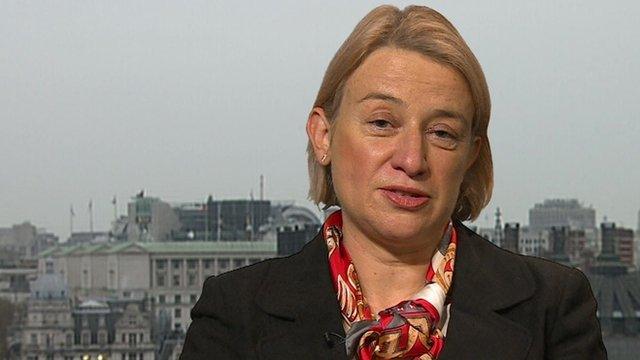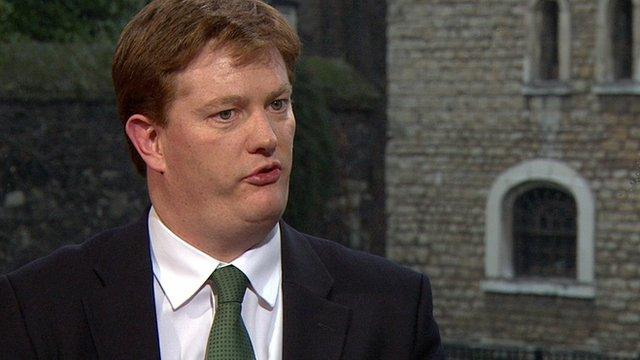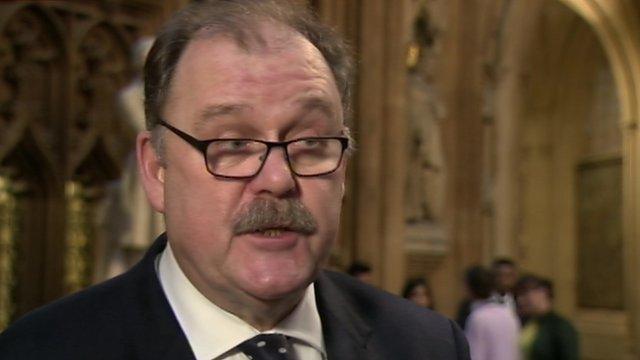In quotes: Reaction to the chancellor's Autumn Statement
- Published
Politicians, campaigners and commentators give their verdict on the last Autumn Statement before the general election.
Chancellor George Osborne
George Osborne says the stamp duty in changes his Autumn Statement will benefit 98% of homebuyers
"Today, in the last Autumn Statement of this Parliament, I present a forecast that shows the UK is the fastest growing of any major advanced economy in the world. Back then, Britain was on the brink. Today, against a difficult global backdrop, I can report higher growth, lower unemployment, falling inflation, and a deficit that is falling too. Our long term economic plan is working. Now Britain faces a choice. Do we squander the economic security we have gained, go back to the disastrous decisions on spending and borrowing and welfare that got us into this mess? Or do we finish the job - and go on building the secure economy that works for everyone? I say: we stay the course."

Ed Balls, shadow chancellor
Ed Balls MP: "Every target missed, every test failed, every promise broken"
"It's all here in black and white, hard evidence from the Office for Budget Responsibility that the chancellor's borrowing targets are all in tatters. We all know he's changed the way he styles his hair but he can't brush away the facts. People are worse off and he's failed to balance the books in this Parliament. I've got to say, for all his strutting, for all his preening, for all his claims to have fixed the economy, he promised to make people better off, working people are worse off. He promised we were all in this together and he cut taxes for millionaires. He promised to balance the books in this Parliament and that commitment is now in tatters. Every target missed, every test failed, every promise broken."

Danny Alexander, Lib Dem Chief Secretary to the Treasury
Lower income tax receipts are to blame for higher-than-expected borrowing figures, Danny Alexander has said
"Today's Autumn Statement has Liberal Democrat influence at its core. The Liberal Democrats are building a stronger economy and a fairer society where everyone is given the opportunity to get on in life. We will stick to the plan to deal with the current budget deficit by the end of 2017/18, but we will do so in a way that is fair by asking the wealthiest to continue to pay their fair share. It is because there are Liberal Democrats in government that we have an economic recovery. And it because there are Liberal Democrats in government that the recovery will be sustainable and that the repair job will be done fairly."

Mark Reckless, UKIP MP
Mark Reckless MP: "If the economy's doing so well, why are we borrowing more than France, Italy, Spain or Greece?"
"I said to the chancellor that if the economy's doing so well, why are we borrowing more than France, Italy, Spain or Greece? He likes to blame Labour but actually a lot of the explanation is his massive increases in spending, overseas aid, the European Union and renewable spending subsidies. What we'd like to do is reduce the deficit at least as fast as has been set out. We would challenge the Barnett formula, where Scotland gets 20% more spending than elsewhere; the main three parties in Westminster have guaranteed that, we want to see fair treatment for English taxpayers. We'd also abolish the Department for Energy and Climate Change and the Department of Culture, Media and Sport and make £3bn savings through that."

Natalie Bennett, Green Party leader
Green Party leader Natalie Bennett says the Autumn Statement is made up of "wrong spending for the wrong reasons"
"What we're seeing is the wrong spending for the wrong reasons. This is the day that we've learned we're heading for the warmest year ever yet we're cutting air passenger duty and freezing fuel tax. We've seen the failed policy of austerity has made the poor the disadvantaged, the disabled, the young pay for the error and the fraud of the bankers and yet we're not seeing any spending given back to those people who so desperately need help. We're also seeing £15bn of new and utterly unnecessary spending on failed road schemes The government has failed to deal with the essential pressing problems of poverty, of the rise of food banks, of low wages and instead it's six months before the election got an offer which looks superficially attractive."

John Swinney, SNP, Deputy first minister
Deputy First Minister John Swinney confirms that the NHS in Scotland will benefit from additional funding in George Osborne's autumn statement
"While the chancellor gives Northern Ireland the power to cut corporation tax, his government is continuing to block the job-creating powers Scotland needs. The consequentials of around £200m we have received today cannot compensate for the £2.7bn of real terms cuts we have faced since 2010. And with a further £25bn of cuts in the future, the Westminster government is locking Scotland into austerity against our wishes."

Elfyn Llwyd, Plaid Cymru
Plaid Cymru's Elfyn Llwyd MP: "It just shows, really, where the priorities lie still - the priorities lie in England"
"There have been lost opportunities here. We have since 2008 been calling for an extra 1% of GDP invested in infrastructure which would have delivered about £800m per annum for Wales. Where is it? It seems to me there are plenty of opportunities to announce various things for England and re-announce things. Roads and so on. It shows where the priorities lie still. The priorities lie in England. "

Robert Chote, chairman of the Office for Budget Responsibility
"The forecast suggests we're halfway through what is a 10 year fiscal repair job. The deficit was a little over 10% of national income back in 2010; it's roughly halved and the government wants to eliminate that and be running a small surplus by the end of next Parliament. We only have firm spending plans set out department by department until 2015/16 so the government has had to tell us what it wants to assume on spending thereafter. The implication is that you have a very sharp squeeze on public spending over the next Parliament but it's important to emphasise those figures aren't inked in yet. We've certainly seen disappointing tax receipts this year. The economy has been doing better than expected but unfortunately it's been doing better than expected in those areas that deliver less receipts for the chancellor."

John Cridland, director general of the CBI
"These major changes on stamp duty and business rates will be a shot in the arm for families and growing firms as they look towards 2015. The targeted focus on enterprise is right, but business innovators would have liked to see more on research and development to boost UK investment."

Larry Elliot, the Guardian's economics editor
"Given the way in which Britain obsesses about bricks and mortar, changing the way stamp duty is levied pushes all the buttons. It makes sense in itself as a replacement for the current "slab" system whereby a tiny change in the transaction price can lead to a huge increase in the tax liability. It appeals directly to aspirational voters in key seats. By raising more money from those buying expensive homes, it is a direct contrast with Labour's mansion tax. As a political coup, it worked."

Fraser Nelson, editor of Spectator magazine
"His great genius was making it sound like a great success. The numbers are terrible; he's completely failed on his deficit target, he's projecting incredible cuts on whoever comes after him and yet he's done a lap of honour. And he's come up with his own mansion tax today. Stamp duty is in effect a huge tax on anybody buying a house worth more than £1m. You've got to hand it to him. He set out to shoot Labour foxes and he succeeded but he went far closer to Labour than I would like."

George Eaton, political editor of the New Statesman
"No party is prepared to itemise the next dose of austerity. Labour and the Conservatives respectively target the wealthy and welfare for further fiscal tightening. But seeking to raise more from these popular sources is the politics of easy choices, not hard ones. The Institute for Fiscal Studies estimates that £12bn of additional consolidation will be required merely to maintain departmental spending cuts at their current level: a gap no party has come close to bridging. Some are more guilty than others - the Conservatives' promise to cut taxes by £7.2bn, avoid further tax rises and eliminate the deficit by the end of the next parliament being the most egregious - but none is innocent. Divided on much else, the parties are united in a conspiracy of silence about the pain ahead. Read George Eaton's full article here, external.

Janan Ganesh, Financial Times columnist
"While the Autumn Statement will be parsed for populist symbolism - the strikes on banks and corporations, the pitch to aspirant homeowners, the building projects in marginal constituencies - Mr Osborne's political work was largely done when Labour refused a reckoning with its own past at the start of this parliament. The recovery has helped the Tories but voters already favoured them to manage the economy even when growth was anaemic. None of this assures victory in May: in some polls, the Conservatives led Labour on perceived economic competence on the eve of their rout in 1997. It just means that a Tory loss this time will have less to do with the economy than with reservations about their character and motives that have never gone away. The party's inability to soften its hard image, Labour's inability to show it can govern sanely — these are the parallel failures that shape our politics." Read Janan Ganesh's full article., external.

Quentin Letts, Daily Mail columnist
"The Osborne voice, never resonant, was dry from the start. He should go on a binge of stilton and port and Havanas before big parliamentary speeches. We were 'the fastest growing of any major, advanced economy in the world', he said. How much better it would have sounded with a rich baritone - Jeremy Irons, say - than in this Joe Pesci alto. His opponent Ed Balls was also on squeaky form, the Shadow Chancellor's voice lacking its customary boom. Perhaps they both have this cold doing the rounds." Read Quentin Letts's full article., external.

Frances O'Grady, TUC general secretary
"Real wages are set to stay below their pre-crisis value until beyond the end of the next parliament. And public sector workers have been told that their real wages will be cut until the deficit has closed, which the OBR now expects to take the whole of the next Parliament. Making the cuts on the chancellor's timetable will slash public spending per head from £5,650 to £3,880. That will take us back at least to the level of spending in 1948 and probably to the lowest spending levels for 80 years. This can only be done by deep cuts to vital services that threaten social cohesion and stability. As 60% of the cuts are still to come, this will result in a revolutionary programme to shrink the state."

David Sparks, chairman of the Local Government Association
"Today's Autumn Statement spared hard-pressed local services from further bad news. The chancellor has confirmed that local services will not face additional cuts next year, on top of those already announced. In doing so, government has acknowledged the huge contribution councils have already made to balancing the country's books, and the fragile financial position in which this has placed many local authorities. "

John Longworth, director general of the British Chambers of Commerce
"The chancellor has used the last Autumn Statement before the election to demonstrate that he is listening to and supporting British businesses across the entire country. By focusing on key business priorities, such as Britain's broken business rates system and the difficulty of accessing finance for growth, the chancellor has demonstrated that he is committed to solving problems that hinder the growth aspirations of many firms."

Len McCluskey, Unite general secretary
"The vast majority of people listening to George Osborne talking about an economic recovery will think it's a figment of his imagination. This is a phoney recovery, built on dangerous levels of consumer debt that are the highest across Europe, run up as people borrow to get by because his government's policies have made people poorer, the rich richer and cut income to the Treasury."

Simon Walker, director general of the Institute of Directors
"This was a disciplined, long-term and forward-looking statement with welcome reforms for businesses, employers, savers and home-buyers. The chancellor was right to resist the temptation of politicised giveaways and focus instead on long-term investment in infrastructure, science and efforts to boost the UK's productivity."

Paul Kenny, general secretary of the GMB union
"The so-called prudent Mr Osborne will borrow more in five years at the Treasury than Labour chancellors he labels as profligate did in 13. The real value of take-home pay for workers is 13% below pre-recession levels while many of the new jobs are precarious and badly paid. If this is success, I would not like to think what failure looks like."

Tony Dolphin, chief economist of the Institute for Public Policy Research
"The lesson of the last four-and-a-half years is that aggressive cuts in the government's deficit are likely to be associated with weaker growth; more moderate cuts with healthy expansion. It appears, however, that the chancellor has not learned this lesson, because he is planning to step up significantly the pace of deficit reduction over the next few years."

Chris Walker, head of housing for Policy Exchange
"This was a budget for aspirational Britain. The chancellor pulled a significant rabbit out of his hat in the form of a major and immediate overhaul of stamp duty. Taxing property transactions can be a major barrier to home ownership, so it is important to do so fairly and efficiently. "

Lily Caprani, the Children's Society
"Even in a time of austerity, the government has choices about where to invest and where to cut. This Autumn Statement fails to support the most disadvantaged children in the country who have already suffered the brunt of cuts."

Dr Eva Neitzert, the Fawcett Society
"The chancellor's assertion that the coalition is presiding over an 'economy that works for all' will not ring true for the one in four female employees now in low-paid work."

John Allan, chairman of the Federation of Small Businesses
"The chancellor has listened to the needs of business, despite tight public finances. The FSB is delighted to see the double small business rate relief remain for another year and a full review of the outdated business rates system - something we've long argued for."
- Published3 December 2014

- Published3 December 2014

- Published3 December 2014
